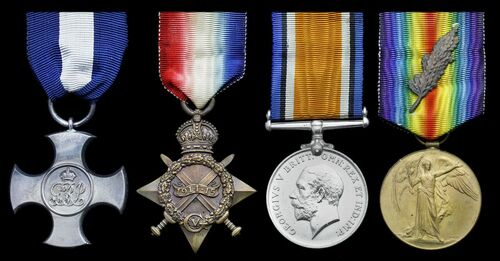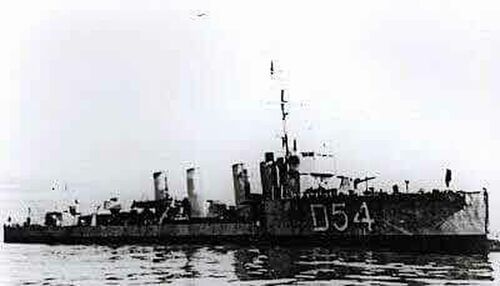Auction: 24002 - Orders, Decorations and Medals
Lot: 175
A rare 'Battle of Dogger Bank 1915' D.S.C. group of four awarded to Surgeon Lieutenant J. A. Stirling, Royal Naval Volunteer Reserve who, whilst serving on Meteor, descended into the stoke-hole where a shell from the Blucher had exploded; attending to the wounded he amputated a stoker's leg oblivious to the carnage surrounding him
Distinguished Service Cross, the reverse engraved '24th Jany 1915. Surg Probr Jas. A. Stirling. R.N.V.R. 27th Mar. 1915.', hallmarks for London 1914; 1914-15 Star (Surg. J. A. Stirling, D.S.C., R.N.V.R.); British War and Victory Medals, with M.I.D. oak leaves (Surg. Lt. J. A. Stirling. R.N.), minor pitting, very fine (4)
3 D.S.C.'s awarded in the action, of which this was the only one to a Commissioned Rank.
D.S.C. London Gazette 3 March 1915.
James Alexander Stirling M.B., B.CH., D.P.H., was born on 9 February 1894 to John Stirling, the police Chief Constable at Grimsby who distinguished himself during the unrest of the great fishing strike. In December 1914 whilst at Edinburgh University studying medicine, he volunteered in the Royal Naval Volunteer Reserve joining the torpedo boat Meteor as probationary surgeon.
Brass Hats & Bell Bottoms by William Guy Carr vividly describes the deed which resulted in the D.S.C. being awarded to Striling:
'Incidentally, the probationary surgeon, James A Stirling, R.N.V.R., aboard the Meteor received his D.S.C. for courageously descending into the stoke-hole (where the enemy shell had exploded) and with the aid of candlelight amputating a stoker's leg which was badly fractured and jammed solidly amongst the mass of twisted iron and steel. The poor fellow was like a bear which, after being wounded, had fallen foul of a trap in a pitfall. His position was so precarious and his sufferings so great that the heroic young student went down into the darkness and worked in the very bowels of the ship, with thick smoke, acrid fumes and escaping steam all around him and his gallant assistants. These men worked removing the dead and assisted the wounded, not knowing the moment the Meteor might take her final plunge. The guns boomed angrily as the battle raged. Zeppelin and aeroplane dropped their bombs uncomfortably close, but calm and collectedly these heroes performed the crude surgical operation, and finally they carried their shipmate up on deck and made as comfortable as circumstances permitted until the drug injected by the hypodermic needle took effect.'
The Meteor sustained several casualties when she was hit by an 8.2-inch shell from the Blucher during the Battle of Dogger Bank. Of the men wounded in action aboard Meteor during the Battle there were only two, Able Seaman Smith and Stoker Petty Officer William Rose. It is likely given the location of the dramatic events recounted above that it was Rose who came under Stirling's knife. Tragically despite the remarkable care which saw him survive the initial trauma of the event Rose died the day after the battle, doubtless a far better passing than he would have suffered if not for the bravery of Stirling and his assistants.
Invested with his D.S.C. at Buckingham Palace on 27 March 1915 by the King, Stirling left Meteor in mid-1915 to resume his medical studies graduating with an M.B. in 1917. He was later appointed as Surgeon Lieutenant Royal Navy serving initially at Haslar Hospital, Gosport until 8 March 1918 and then Simon's and Co. shipyard at Renfrew where he joined the destroyer Silene on her commissioning.
On returning to Edinburgh to complete his studies, he was elected president of the Student's Representative Council. After house appointments he worked for the county councils of Kincardine, Cumberland, Durham and later Chesterfield. He was President of the Society of Medical Officers of Health in 1958 and in 1961 was admitted to the Roll of Fellows of the British Medical Association. Stirling died on 1 November 1971, his obituary appears in the BMA Journal of 20 November 1971; sold together with copied research and seven brief conduct reports.
Subject to 20% VAT on Buyer’s Premium. For more information please view Terms and Conditions for Buyers.
Sold for
£1,600
Starting price
£800







